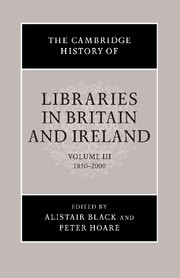Book contents
- Frontmatter
- Introduction: sources and methodologies for the history of libraries in the modern era
- 1 Libraries and the modern world
- Part One Enlightening the Masses: the Public Library as Concept and Reality
- Part Two The Voluntary Ethic: Libraries of our Own
- Part Three Libraries for National Needs: Library Provision in the Public Sphere in the Countries of the British Isles
- 15 Introduction: library provision in the countries of the British Isles
- 16 The library scene in an English city: Newcastle upon Tyne libraries 1850–2000
- 17 Public libraries in Wales since 1862
- 18 The National Library of Wales
- 19 The Scottish library scene
- 20 The National Library of Scotland
- 21 The Irish library scene
- 22 The National Library of Ireland
- Part Four The Nation's Treasury: Britain's National Library as Concept and Reality
- Part Five The Spirit of Enquiry: Higher Education and Libraries
- Part Six The Rise of Professional Society: Libraries for Specialist Areas
- Part Seven The Trade and its Tools: Librarians and Libraries in Action
- Part Eight Automation Pasts, Electronic Futures: the Digital Revolution
- Bibliography
- Index
- References
19 - The Scottish library scene
from Part Three - Libraries for National Needs: Library Provision in the Public Sphere in the Countries of the British Isles
Published online by Cambridge University Press: 28 March 2008
- Frontmatter
- Introduction: sources and methodologies for the history of libraries in the modern era
- 1 Libraries and the modern world
- Part One Enlightening the Masses: the Public Library as Concept and Reality
- Part Two The Voluntary Ethic: Libraries of our Own
- Part Three Libraries for National Needs: Library Provision in the Public Sphere in the Countries of the British Isles
- 15 Introduction: library provision in the countries of the British Isles
- 16 The library scene in an English city: Newcastle upon Tyne libraries 1850–2000
- 17 Public libraries in Wales since 1862
- 18 The National Library of Wales
- 19 The Scottish library scene
- 20 The National Library of Scotland
- 21 The Irish library scene
- 22 The National Library of Ireland
- Part Four The Nation's Treasury: Britain's National Library as Concept and Reality
- Part Five The Spirit of Enquiry: Higher Education and Libraries
- Part Six The Rise of Professional Society: Libraries for Specialist Areas
- Part Seven The Trade and its Tools: Librarians and Libraries in Action
- Part Eight Automation Pasts, Electronic Futures: the Digital Revolution
- Bibliography
- Index
- References
Summary
By the middle of the nineteenth century Scotland had enjoyed well over a hundred years of a distinctive library culture, reflecting its independent legal and education systems, its particular geography and sociology. This culture derived partly from the foundations of the ‘first endowment’ period centred on the years 1680–1720, when endowed libraries such as the Innerpeffray Library and the Leighton Library at Dunblane were set up by individual benefactors in local communities, largely with educational or theological intent. The established Church of Scotland brought its own distinctive views of book use; its policy that library provision in the Highlands should be the product of intervention from the Lowlands was still being applied 200 years later. A final and most characteristic influence came from the climate of community-based activity, influenced strongly by the ideas of the Scottish Enlightenment, with its emphasis on social philosophy. From these ideas, and earlier social thinking back to John Locke, had developed the concept of mutual improvement, which may be defined as the spiritual and intellectual improvement of the social individual through corporately organised intellectual activity.
Scotland in the mid-nineteenth century had a wide variety of means of access to literature: book clubs and middle-class subscription libraries were widespread (circulating libraries were less common, and were largely concentrated in the towns of the east coast). It also had as many universities as the rest of the United Kingdom put together, and their libraries had long been rooted in the local community, unlike their English counterparts.
- Type
- Chapter
- Information
- The Cambridge History of Libraries in Britain and Ireland , pp. 235 - 244Publisher: Cambridge University PressPrint publication year: 2006



